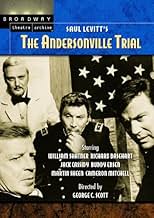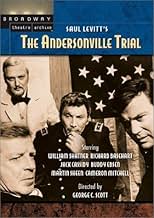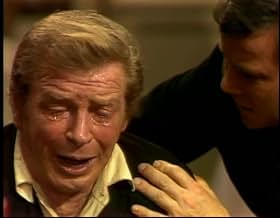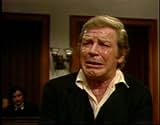अपनी भाषा में प्लॉट जोड़ेंA dramatization of the 1865 war-crimes trial of Henry Wirz, commandant of the notorious Confederate POW camp at Andersonville, Georgia.A dramatization of the 1865 war-crimes trial of Henry Wirz, commandant of the notorious Confederate POW camp at Andersonville, Georgia.A dramatization of the 1865 war-crimes trial of Henry Wirz, commandant of the notorious Confederate POW camp at Andersonville, Georgia.
- 3 प्राइमटाइम एमी जीते
- 4 जीत और कुल 2 नामांकन
Dal McKennon
- First Guard
- (as Dallas McKennon)
William Bryant
- The Lieutenant
- (as Bill Bryant)
फ़ीचर्ड समीक्षाएं
I have not seen this this very fine courtroom drama in almost thirty years, but it remains an unforgettable experience. Basehart, Shatner, Cassidy, Salmi, and Mitchell all give excellent performances. It is also a highly intelligent film, dealing with complex issues of military morality. indeed, it is puzzling that this fine film has never been rerun..then again, most of the great Television dramas are never rerun. Perhaps a new cable network could be created..call it "QTV' for "quality Television', devoted to shows like The Defenders, Naked City, Slatterys People,The Westerner,My World ( And Welcome to It), Nichols and to the great dramas of the golden age, such as this. Of course, thats yet another impossible dream
I watched this on TV when I was 13 or 14 yrs old and was engrossed in it. It left a lasting impression on me. Even to this day, I still think about it. As a kid, I couldn't have told you if the acting was first rate. Evidently it was; I do remember thinking the actors presented it as if the story had happened to them. I also remember being aware that William Shatner was remarkably restrained in this role and thinking how convincing he was.
I can't say this particular movie sparked my interest in American history, but it certainly looms large. Even if the story has been "Hollywood-ized" with the addition of bogus testimony of the camp commandant, the rest of the story is quite true. The sad story of Civil War POW's at Camp Sumter (the actual name of the prison) should be studied by all, not just students of American history. Incidentally, the Andersonville National Historic Site (outside of Richmond, VA) is the only national park that serves as a memorial for ALL American POW's. Because of having seen this movie, I sought out more info about the actual place and actual facts. This doesn't necessarily prove it's a well made movie, but it's the highest compliment I can pay to The Andersonville Trial.
To me, the time invested in watching this movie is worth it.
I can't say this particular movie sparked my interest in American history, but it certainly looms large. Even if the story has been "Hollywood-ized" with the addition of bogus testimony of the camp commandant, the rest of the story is quite true. The sad story of Civil War POW's at Camp Sumter (the actual name of the prison) should be studied by all, not just students of American history. Incidentally, the Andersonville National Historic Site (outside of Richmond, VA) is the only national park that serves as a memorial for ALL American POW's. Because of having seen this movie, I sought out more info about the actual place and actual facts. This doesn't necessarily prove it's a well made movie, but it's the highest compliment I can pay to The Andersonville Trial.
To me, the time invested in watching this movie is worth it.
This greater than two-hour drama recreates the trial of Henry Wirz, commandant of the Confederate POW camp at Andersonville, Georgia. It has an amazing cast of prominent stars of the time, some of whom are quite recognizable, such as Alan Hale as a member of the jury who doesn't even have any lines, and relatively unknown at the time, Charlie Sheen, who only has one line as a soldier.
William Shatner has the largest role as prosecutor and, contrary to his general reputation, does not over-emote but instead pretty much nails the role. He struggles with duty versus conscience, as the crux of his moral argument is that Wirz should have disobeyed direct orders and done more to care for the prisoners in his charge, but then no military tribunal of the time would agree that it is ever acceptable to disobey orders and it would be career suicide to directly argue such a thing. Wirz is played by Richard Basehart, who I've always found to be an underrated actor. Jack Cassidy is the attorney for the defense, Otis Baker, who is a Confederate sympathizer and wishes to point out the hypocrisy of the situation - Confederate prisoners under the care of the Union died in terrible circumstances as well - but he gets shut down by the judge in the situation, played by Cameron Mitchell, who is bombastic in temperament but fair.
The entire play is set inside the courtroom, lasts two and a half hours, and besides being a showcase of very good acting and instructive on Civil War history, it indicates how much longer of an attention span audiences must have had 55 years ago. Public TV would never attempt something of this length in this format today.
George C. Scott, the director, got a very authentic performance out of William Shatner, who could ordinarily be quite stiff. In retrospect, perhaps Scott should have directed a few episodes of Star Trek.
William Shatner has the largest role as prosecutor and, contrary to his general reputation, does not over-emote but instead pretty much nails the role. He struggles with duty versus conscience, as the crux of his moral argument is that Wirz should have disobeyed direct orders and done more to care for the prisoners in his charge, but then no military tribunal of the time would agree that it is ever acceptable to disobey orders and it would be career suicide to directly argue such a thing. Wirz is played by Richard Basehart, who I've always found to be an underrated actor. Jack Cassidy is the attorney for the defense, Otis Baker, who is a Confederate sympathizer and wishes to point out the hypocrisy of the situation - Confederate prisoners under the care of the Union died in terrible circumstances as well - but he gets shut down by the judge in the situation, played by Cameron Mitchell, who is bombastic in temperament but fair.
The entire play is set inside the courtroom, lasts two and a half hours, and besides being a showcase of very good acting and instructive on Civil War history, it indicates how much longer of an attention span audiences must have had 55 years ago. Public TV would never attempt something of this length in this format today.
George C. Scott, the director, got a very authentic performance out of William Shatner, who could ordinarily be quite stiff. In retrospect, perhaps Scott should have directed a few episodes of Star Trek.
A wonderful TV movie about the most notorious of the "concentration camps" of the American Civil War. It has a first-rate cast, with Richard Basehart giving an especially intense performance as the camp commandant. I hope some day it comes out on video or is rebroadcast, perhaps by the History Channel.
One of the many pleasures of this compelling court martial drama, adapted from Saul Levitt's 1959 Broadway play, is seeing actors we associate from with lightweight TV shows doing something meatier.
Lt. Col. N.P Chipman (William Shatner) is the Army prosecutor, Otis Baker (Jack Cassidy) the defense attorney and Gen. Lew Wallace (Cameron Mitchell) the judge in the trial of Henry Wirz (Richard Basehart), the Confederate officer who ran a prisoner of war camp in Andersonville which saw 14,000 Union prisoners die from cruel neglect. Witnesses include Lt. Col. Chandler (Harry Townes), who was assigned to inspect the Andersonville prison; Dr. John C. Bates (Buddy Ebsen), the physician at the camp horrified by his experience; Ambrose Spencer (John Anderson), a plantation owner who can testify that food offered to the camp by nearby residents was refused; James Davidson (Michael Burns, whose liquid blue eyes are an asset to his performance), a haunted 19-year-old prisoner who claims a fellow was torn apart by dogs; Jasper Culver (Lou Frizell) another prisoner who has a story about a man named Chickamauga; Sgt. James Gray (Albert Salmi) who testifies that Wirtz killed a man with his own hands; and Dr. Ford (Whit Bissell), the one witness for the defense. Martin Sheen has a bit as a Union officer; Alan Hale Jr. (the Skipper on "Gilligan's Island") plays one of the court-martial board members, though he has no lines.
My favorite among the supporting cast is Buddy Ebsen, who as Jeb Clampett in "The Beverly Hillbillies" always gave the part far more than it seemed to deserve; here he gives his small role tremendous force with a low-key performance. I also enjoyed John Anderson, who I know from "Twilight Zone" episodes and his role as a used car salesman in "Psycho"; his performance here is typical but welcome.
Jack Cassidy has the same oily charm that serves him so well as a "Columbo" villain; but his character also has a strong sense of justice and credibly charges hypocrisy in his opponent. William Shatner, forever to be associated with "Star Trek," is not the perfect choice for a righteous crusader undergoing his own moral struggle: genuine sincerity always eludes him. But he still gives a richly textured performance and finally is successful in his role. The richest performance by far is from Richard Basehart as the German-accented Confederate officer who chose to follow orders from his military superiors while vetoing his own conscience. The parallels between him and Nazi war criminals is made clear; and Basehart brings out every subtlety to the man in a big, but not overdone or showy, manner.
George C. Scott, who had Shatner's role in the Broadway production, directs admirably well. The play is based on the transcript of the actual trial, with significant changes made for dramatic purposes; for one, Wirz did not testify on his own behalf, as he does here. This is highly recommended to anyone looking for a weighty drama, or a fascinating glimpse at American history.
Lt. Col. N.P Chipman (William Shatner) is the Army prosecutor, Otis Baker (Jack Cassidy) the defense attorney and Gen. Lew Wallace (Cameron Mitchell) the judge in the trial of Henry Wirz (Richard Basehart), the Confederate officer who ran a prisoner of war camp in Andersonville which saw 14,000 Union prisoners die from cruel neglect. Witnesses include Lt. Col. Chandler (Harry Townes), who was assigned to inspect the Andersonville prison; Dr. John C. Bates (Buddy Ebsen), the physician at the camp horrified by his experience; Ambrose Spencer (John Anderson), a plantation owner who can testify that food offered to the camp by nearby residents was refused; James Davidson (Michael Burns, whose liquid blue eyes are an asset to his performance), a haunted 19-year-old prisoner who claims a fellow was torn apart by dogs; Jasper Culver (Lou Frizell) another prisoner who has a story about a man named Chickamauga; Sgt. James Gray (Albert Salmi) who testifies that Wirtz killed a man with his own hands; and Dr. Ford (Whit Bissell), the one witness for the defense. Martin Sheen has a bit as a Union officer; Alan Hale Jr. (the Skipper on "Gilligan's Island") plays one of the court-martial board members, though he has no lines.
My favorite among the supporting cast is Buddy Ebsen, who as Jeb Clampett in "The Beverly Hillbillies" always gave the part far more than it seemed to deserve; here he gives his small role tremendous force with a low-key performance. I also enjoyed John Anderson, who I know from "Twilight Zone" episodes and his role as a used car salesman in "Psycho"; his performance here is typical but welcome.
Jack Cassidy has the same oily charm that serves him so well as a "Columbo" villain; but his character also has a strong sense of justice and credibly charges hypocrisy in his opponent. William Shatner, forever to be associated with "Star Trek," is not the perfect choice for a righteous crusader undergoing his own moral struggle: genuine sincerity always eludes him. But he still gives a richly textured performance and finally is successful in his role. The richest performance by far is from Richard Basehart as the German-accented Confederate officer who chose to follow orders from his military superiors while vetoing his own conscience. The parallels between him and Nazi war criminals is made clear; and Basehart brings out every subtlety to the man in a big, but not overdone or showy, manner.
George C. Scott, who had Shatner's role in the Broadway production, directs admirably well. The play is based on the transcript of the actual trial, with significant changes made for dramatic purposes; for one, Wirz did not testify on his own behalf, as he does here. This is highly recommended to anyone looking for a weighty drama, or a fascinating glimpse at American history.
क्या आपको पता है
- ट्रिवियाAll of the witnesses as portrayed in the film are the actual witnesses who testified at Wirz's trial, and their dialogue in many cases is taken almost verbatim from the trial transcript. The major change from history is that Wirz did not testify and the whole "moral issue", around which this film revolves, was never raised at the trial.
- गूफ़Early on, a captain played by Martin Sheen comes into the court to tell Gen. Wallace that the defendant tried to hurt himself. The crossed sabers insignia of the cavalry on Sheen's cap is upside down.
- कनेक्शनFeatured in The 23rd Annual Primetime Emmy Awards (1971)
टॉप पसंद
रेटिंग देने के लिए साइन-इन करें और वैयक्तिकृत सुझावों के लिए वॉचलिस्ट करें
विवरण
इस पेज में योगदान दें
किसी बदलाव का सुझाव दें या अनुपलब्ध कॉन्टेंट जोड़ें

























